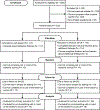ORCA, a values-based decision aid for selecting additional findings from genomic sequencing in adults: Efficacy results from a randomized trial
- PMID: 35522237
- PMCID: PMC9586129
- DOI: 10.1016/j.gim.2022.04.008
ORCA, a values-based decision aid for selecting additional findings from genomic sequencing in adults: Efficacy results from a randomized trial
Abstract
Purpose: Individuals having genomic sequencing can choose to be notified about pathogenic variants in genes unrelated to the testing indication. A decision aid can facilitate weighing one's values before making a choice about these additional results.
Methods: We conducted a randomized trial (N = 231) comparing informed values-choice congruence among adults at risk for a hereditary cancer syndrome who viewed either the Optional Results Choice Aid (ORCA) or web-based additional findings information alone. ORCA is values-focused with a low-literacy design.
Results: Individuals in both arms had informed values-choice congruence (75% and 73% in the decision aid and web-based groups, respectively; odds ratio [OR] = 1.10, 95% CI = 0.58-2.08). Most participants had adequate knowledge (79% and 76% in the decision aid and web-based groups, respectively; OR = 1.20, 95% CI = 0.61-2.34), with no significant difference between groups. Most had information-seeking values (97% and 98% in the decision aid and web-based groups, respectively; OR = 0.59, 95% CI = 0.10-3.61) and chose to receive additional findings.
Conclusion: The ORCA decision aid did not significantly improve informed values-choice congruence over web-based information in this cohort of adults deciding about genomic results. Both web-based approaches may be effective for adults to decide about receiving medically actionable additional results.
Keywords: Decision aid; Genomic sequencing; Incidental results; Informed consent; Secondary findings.
Copyright © 2022 American College of Medical Genetics and Genomics. All rights reserved.
Conflict of interest statement
Conflict of Interest All authors declare no conflicts of interest.
Figures



References
-
- Kalia SS, Adelman K, Bale SJ, et al. Recommendations for reporting of secondary findings in clinical exome and genome sequencing, 2016 update (ACMG SF v2.0): A policy statement of the American College of Medical Genetics and Genomics. Genet Med 2017;19(2):249–255. - PubMed
-
- Arora S, Haverfield E, Richard G, Haga SB, Mills R. Clinical and counseling experiences of early adopters of whole exome sequencing. J Genet Couns 2016;25(2):337–343. - PubMed
-
- Hoskovec JM, Bennett RL, Carey ME, et al. Projecting the supply and demand for certified genetic counselors: A workforce study. J Genet Couns 2018;27(1):16–20. - PubMed
Publication types
MeSH terms
Grants and funding
LinkOut - more resources
Full Text Sources

